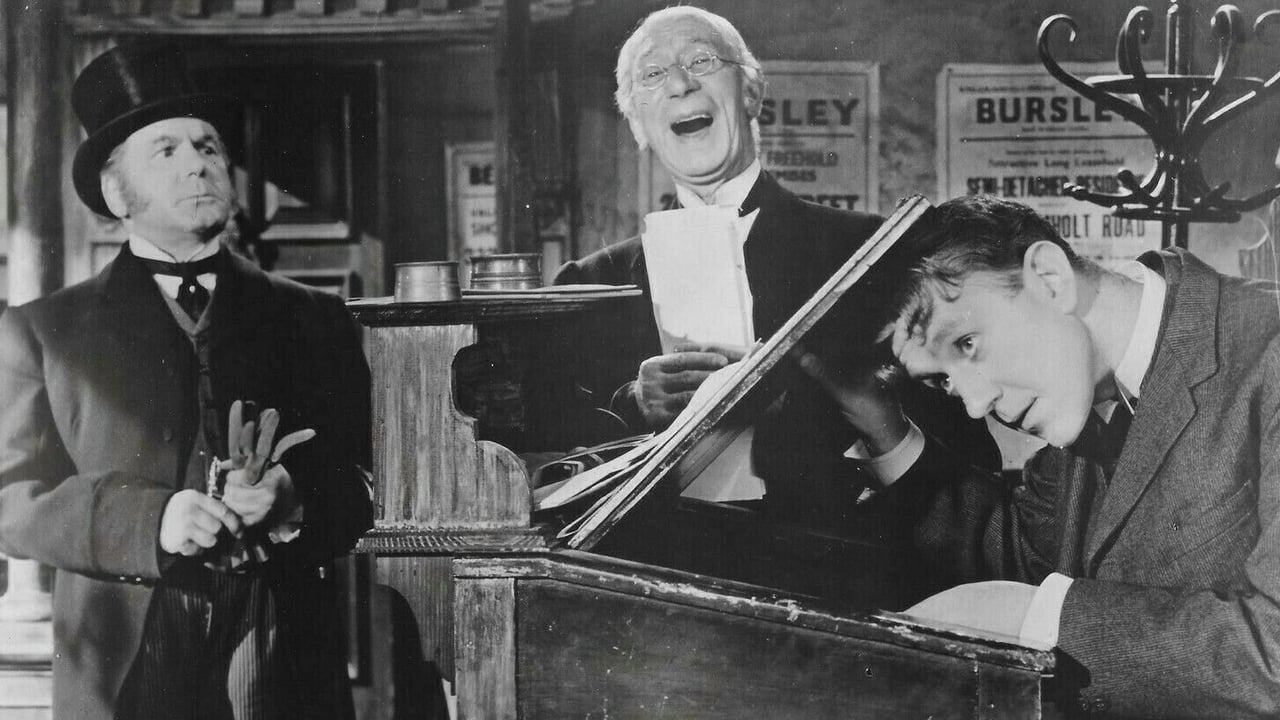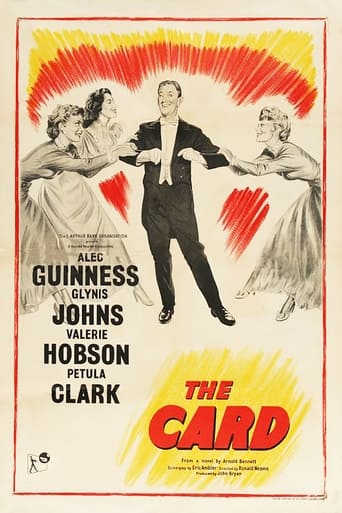writers_reign
I had several opportunities to watch this over the years but I could never work up much of a sweat for 'period' pieces, especially period pieces set in the Midlands and points north, to put it another way things like Hobon's Choice, Hindle Wakes, Love On The Dole and their ilk were anathema to me, and in the interests of fair play even something more 'southern' like The History of Mr. Polly also lacked appeal. Finally I spotted a DVD of The Card with a bonus in the shape of a TV play written for Guiness by John Mortimer so I shelled out two quid and found The Card to be a pleasant diversion with competent performances and a left-handed charm going for it. It would seem that better late than never hits the spot.
James Hitchcock
A "card" in Edwardian slang was a "character", someone able to get himself talked about. (Or at least in Edwardian British slang; the word does not seem to have been used in this sense in the United States, which explains why Arnold Bennett's novel was published over there as "Denry the Audacious"). By 1952 this usage already sounded a bit outdated, but Bennett's title was kept for this film version, although it was entitled "The Promoter" for American audiences.The film was not made by Ealing Studios, but it came out during that studio's heyday and has certain similarities with the famed Ealing Comedies, not least the presence of Alec Guinness in the starring role. Like several of those comedies, its theme is that of the "little man" taking on the system. There is, however, an important difference. Some commentators such as Simon Heffer have seen the Ealing Comedies as characterised by an essentially conservative world-view, but there is one feature which has always struck me as more socialist. Whenever the "little man" tries to take on the system as an individual, as Guinness's characters do in "The Lavender Hill Mob" and "The Man in the White Suit", he generally ends up losing. When a whole community of "little people" takes on the system, as in "Whisky Galore", "Passport to Pimlico" or "The Titfield Thunderbolt", they generally end up winning. In "The Card" the little man comes out triumphantly on top. As in a number of Bennett's other books, the story is set in the Staffordshire Potteries. The film is mainly faithful to plot of the novel, although it omits some incidents, such as Denry's winter sports holiday in Switzerland. The hero is Edward Henry (Denry) Machin, an ambitious young man from a working-class background, who works his way up to become a solicitor's clerk, then a rent collector for local landlords, then a successful and wealthy businessman, and finally the youngest-ever Mayor of his native town. The film also tells of his romances with the scheming, social-climbing Ruth Earp and the sweet young Nellie Cotterill (played here by Petula Clark, later to become better known as one of Britain's most successful pop stars of the sixties). Rags-to-riches stories like this one were a popular subject in 19th and early 20th century literature, but were normally treated in a very serious, earnest way, a chance for the writer to lecture his readers on the importance of the virtues of thrift, sobriety, diligence and hard work. Bennett, however, although he could be a very serious writer in other contexts, treats Denry's story as a comedy. Although Denry never actually does anything illegal, and only occasionally does something unethical (as a boy he cheats at an examination in order to win a scholarship to a prestigious private school), he is a smooth-talking charmer, the sort of successful man whose success is due more to living on his wits and taking advantage of any opportunity that comes his way than to diligence and hard graft. He owes most of his fortune to his creation of a Credit Union, persuading a local aristocrat to act as its Patroness, and his political success to his signing of a star centre- forward for the failing local football club.Guinness's performance as Denry is one of his best, capturing his character's audacious spirit while making him likable, avoiding the temptation (which might have beset some actors( of making him too much of a smart Alec. There are some good supporting performances, especially from Glynis Johns as the mercenary Ruth, although Clark's Nellie is a bit too anonymous. The film captures the optimism which was a feature both of the Edwardian era, when the original novel was written, and of the early fifties, the age of the Festival of Britain and of the Coronation. The film came out in 1952, the first year of our present Queen's reign, when people were already starting to talk about a "New Elizabethan Age", and encapsulates a lot of the "can-do" spirit of that period. At the end of the film a self-important local bigwig, who objects to Denry's elevation to the Mayoralty, asks "What great cause is he identified with?" "He's identified," comes the reply, "with the great cause of cheering us all up." "The Card" might not be an Ealing Comedy, but it certainly deserves to be mentioned in the same breath. 9/10
didi-5
A classic Alec Guinness performance, in this case as Denry Machin, a man who sees opportunity around every corner. Typified by his line 'I just do this to make money', Machin is likable as he sets up his 'Thrift Club' to entice locals into giving him money so he can purchase goods at a huge discount.One of the first entrepreneurs, Machin is a lovable rogue and his story is a fun one to watch. A great British classic which showcases Guinness (one of our best actors) alongside British movie luminaries Glynis Johns, Valerie Hobson, and Petula Clark.Much later this story was made into a musical, but sadly that has never yet been filmed. It will be fascinating if that ever makes it to the screen.
esmereldajones
With a tagline "He's the cheekiest man in town!" The Card (Alec Guinness, Glynis Johns) will teach you a few tricks about how to make it in business from scratch.While you watch Denry (Alec Guinness) stride through his blueprint for fortune, don't miss the smart tactics of Ruth (Glynis Johns). No wonder he chose to marry the soft Nellie; Ruth was sharp competition (but how did he resist those amorous blue eyes and pouting appeals?). She urged him to stand for mayor when Nellie was happy with pennies. It's a satisfying ending, but Denry would have been a bigger cracker with Ruth.Writers and entrepreneurs: view it with notebook and pen. It's a 9-star must.

